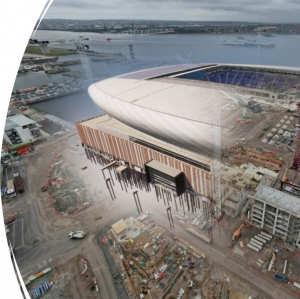The prospect of two new football stadiums—one for Manchester United and another for Newcastle United—is more than just exciting news for fans. These large-scale infrastructure projects promise to bring thousands of jobs, not just in construction but in key technical industries such as data cabling, networking, and IT infrastructure.
Manchester United’s Plans for a New Super-Stadium
Manchester United has revealed plans to build a 100,000-seat stadium, potentially the largest in the UK. This £2 billion project would replace Old Trafford and form part of a huge regeneration scheme for the local area. It is expected to create:
- 92,000 jobs during construction and beyond.
- 17,000 new homes in the surrounding region.
- An estimated £7.3 billion per year boost to the UK economy.
The stadium itself is set to be a technological masterpiece, featuring a unique “umbrella” canopy and towering masts. However, there have been mixed reports on this design element, with some critics comparing it to Butlin’s holiday camps rather than the sleek, futuristic look many had anticipated.
Despite these differing opinions on aesthetics, the real transformation will be in digital infrastructure, requiring:
- Advanced data cabling for high-speed internet and networking.
- Secure IT networks for ticketing, stadium operations, and broadcasting.
- Smart technology to enhance fan experiences, such as interactive screens, high-speed Wi-Fi, and real-time analytics for crowd management.
These requirements translate into long-term job opportunities for skilled professionals in fibre optic cabling, structured cabling installation, and IT support—both during construction and after the stadium is operational.
Newcastle United’s Proposed Move to a 65,000-Seat Stadium
Newcastle United is also considering moving from St James’ Park to a brand-new 65,000-seater stadium. The potential site? Leazes Park, just north of their current ground. While this move is not confirmed, it is being seriously explored to accommodate Newcastle’s growing fanbase.
If built, this new stadium could:
- Create hundreds of jobs in construction and technology.
- Modernise Newcastle’s infrastructure, with cutting-edge networking and digital systems.
- Enhance the club’s global presence, attracting more international fans and investors.
Newcastle’s new stadium is also expected to feature state-of-the-art technology, including:
- High-performance Wi-Fi networks for tens of thousands of fans.
- Live data streaming for match analytics, fan engagement, and security.
- Smart turnstiles and cashless systems, reducing wait times and improving efficiency.
Just like Manchester’s project, this stadium will demand a workforce skilled in data cabling, telecoms, and networking infrastructure—creating excellent opportunities for engineers, technicians, and IT professionals.
How These Stadiums Will Boost Jobs in Data Cabling & Tech
Both stadium projects will drive demand for skilled workers in the technology sector, particularly in:
✅ Data cabling & fibre optics – Installing high-speed internet, security systems, and broadcasting networks.
✅ IT & networking specialists – Setting up secure digital infrastructure to support stadium operations.
✅ AV & broadcast engineers – Ensuring live-streaming, giant screens, and fan engagement tech function seamlessly.
✅ Cybersecurity experts – Protecting sensitive ticketing and payment systems from cyber threats.
With clubs investing heavily in smart stadium technology, these jobs won’t just be short-term opportunities—there will be long-term maintenance, upgrades, and innovations required in the years to come.
Final Thoughts
The potential new stadiums for Manchester United and Newcastle United represent more than just bigger, better football venues. They are massive investments in technology, infrastructure, and job creation—particularly for skilled workers in data cabling, IT, and smart stadium solutions.
For businesses and professionals in these fields, these projects could mean new contracts, new career opportunities, and a long-term role in shaping the future of UK stadium technology.
Whether you’re an engineer, an IT specialist, or a business in structured cabling, now is the time to gear up for the future of football stadium innovation.
CityFibre, established in 2011, has emerged as a significant challenger to BT's dominance in the UK's broadband sector. With an ambitious £8 billion investment plan, the company aims to disrupt the longstanding monopoly and provide consumers with alternative high-speed internet options.
Strategic Partnerships and Network Expansion
In a notable move, CityFibre secured a partnership with Sky in August 2024, allowing Sky to offer its broadband services over CityFibre's network. This collaboration not only expanded Sky's reach but also underscored CityFibre's growing influence in the market. At that time, CityFibre's network covered approximately 3.8 million premises, with plans to extend this to 8 million in the coming years.
Financial Challenges Amidst Ambitious Goals
Despite its rapid growth and strategic alliances, CityFibre has encountered significant financial hurdles. The company's debt has risen to £4 billion, leading to substantial interest payments. Furthermore, the uptake of its services has been slower than anticipated, with only 518,000 active users out of the 4.3 million premises covered by its network. Analysts suggest that CityFibre needs to double its subscription rate merely to cover interest expenses, highlighting the urgency for increased customer acquisition.
Market Dynamics and Future Outlook
The UK broadband market is witnessing intensified competition, with alternative network providers (altnets) like CityFibre challenging established players such as BT's Openreach and Virgin Media O2. While these altnets have made notable inroads, they face challenges related to profitability and scalability. CityFibre's recent financial performance, achieving an EBITDA of £5 million for the full year 2024, reflects both its progress and the broader challenges within the sector.
In conclusion, CityFibre's endeavour to break BT's broadband monopoly represents a pivotal shift in the UK's telecommunications landscape. However, the company's financial sustainability and ability to achieve widespread consumer adoption remain critical factors that will determine its long-term success.
The construction of Everton’s new stadium is a landmark project that is set to redefine the matchday experience for fans while serving as an architectural and technological marvel in the heart of Liverpool. At Bauhaus, we are proud to have played a key role in this ambitious development by supplying high-calibre data cabling engineers who ensured the successful installation of state-of-the-art infrastructure.
Our Role in the Project
Bauhaus was entrusted with the responsibility of providing expert data cabling engineers to work on Everton’s new stadium. Our team contributed significantly to the installation of critical network infrastructure, ensuring the seamless integration of cutting-edge technology that will power the stadium’s connectivity for years to come.
Key highlights of our involvement include:
- Duration: Over 12 months of consistent effort and collaboration.
- Workforce Supply: More than 20 highly skilled data cabling engineers supplied.
- Scope of Work: Installation of robust data cabling infrastructure, ensuring the stadium meets modern connectivity demands for operations, security, and fan engagement.
Overcoming Challenges
Big projects like this always come with a few hurdles – tight deadlines, complex logistics, and making sure the right people are in the right place at the right time. Our engineers put in serious graft, working 10-hour days to meet high standards while collaborating side by side with other contractors on-site. The result? A solid, future-proofed data cabling setup that will keep Everton’s new home connected – from high-speed Wi-Fi to advanced security systems.
Why Bauhaus?
At Bauhaus, we don’t just fill roles – we find the right people for the job. Our wide network of skilled professionals means we can supply the best talent for big, challenging projects across the UK and Europe. Our work on Everton’s stadium is just one example of how we deliver quality, reliability, and compliance every time.
Looking Ahead
With Everton fans counting down the days until their new stadium opens, we’re proud to know that our work will help power their matchday experience. This project has reinforced our reputation as a trusted recruitment partner in data cabling and technical industries.
We’ve also had the privilege of working on other major stadiums, including White Hart Lane and the Etihad. With our experience in delivering high-quality technical teams for large-scale sports venues, we welcome any future stadium projects that require expert data cabling solutions.
If you’re looking for skilled professionals for your next project – whether it’s data centres, large-scale infrastructure, or commercial builds – Bauhaus is here to help.
Want to know more? Get in touch with us today!





